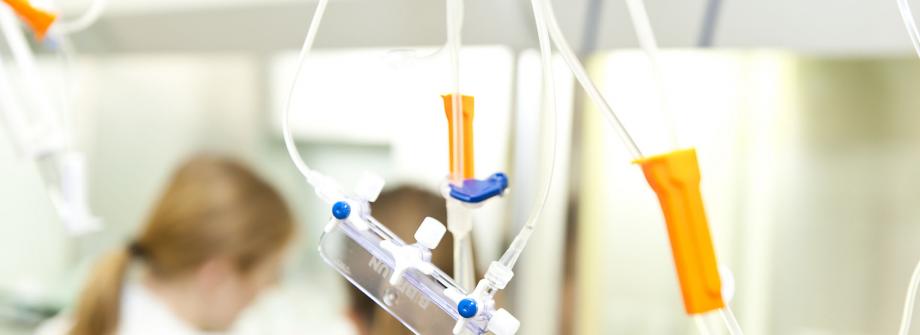
August 2023 Clinical Case of the Month
Title: Allogenic stem cell transplant in Pregnancy associated Aplastic anemia with severe multiple infections.
Submitted by: Amal Hejab, MD and Chokri Benlamine, MD
Physicians expert perspective: Abdullah Alamer, MD and Dr. Ali Alahmari, MD
A 43-year-old woman developed anemia by 12-week of gestation (requiring frequent RBC transfusions). At 32 weeks of gestation, she developed pancytopenia. She was diagnosed with pregnancy-associated severe aplastic anemia (bone marrow cellularity: 10-20%, platelets 20 K, ANC ~ 600). She was managed with romiplostim, prednisone and IVIG until labor was induced at 37 weeks with normal labor. She presented, 14 days after delivery, with septic shock with MSSA bacteremia and multiorgan failure. Her ANC was <200. She had left arm abscess (surgically drained), and left leg cellulitis. She developed infective endocarditis. She developed liver dysfunction with total bilirubin peaking to 10 mg/dl. She remained critically ill for few weeks. She underwent urgent allogenic HSCT (6 weeks post-delivery) from an HLA-matched sibling using mobilized PBSC graft. Conditioning regimen was modified (for organ dysfunction and ongoing sepsis). She received cyclophosphamide (40 mg/kg x2 doses) & fludarabine (40 mg/m2 x3 doses). Her GvHD prophylaxis was tacrolimus & mycophenolate. Mini-methotrexate was avoided (total bilirubin was down to 4.5 mg/dl at the time of HSCT). Early post-transplant period was uneventful. Neutrophil and platelet engrafted on day +12 and day +22 respectively. Her liver function normalized. Her infectious complications subsided, and she regained her strength. She developed acute GVHD of the gut with grade 2 diarrhea and responded promptly to high-dose steroid.
Which of the following management should be considered for this patient’s severe aplastic anemia?
A. Supportive care only
B. ATG and prednisone
C. Allogeneic stem cell transplantation
D. Growth factor support and Eltrombopag
Expert Perspective by Abdullah Alamer, MD and Dr. Ali Alahmari, MD
Bacterial and fungal infections are common causes of morbidity and mortality in patients with severe aplastic anemia (SAA) which is mainly caused by profound and persistent neutropenia (1). The standard of care treatment for SAA in young (<35-40 years) and fit patient with available match related donor is non-myeloablative stem cell transplantation or immunosuppression therapy including preferable horse ATG with cyclosporine and eltrombopag. Selecting the most appropriate treatment modality in the setting of active infection is understandably challenging as there is a concern of exacerbating infection with those treatments versus the risk the increased risk of mortality and morbidity from infection if the underlying neutropenia persists.
Previous retrospective studies showed that Allogeneic stem cell transplant is feasible and might lead to better outcomes for patients with SAA and infections. Xu et al reported outcomes of 65 patients treated with Allo-HSCT in the setting of infection (2). Majority of patients (n = 51) were in partial response/stable disease in regard to their infection status and (n = 15) were in CR. 3-year estimated overall and 3-year failure-free survival were more than 80% with no significant statistical difference between both groups. In another retrospective multicenter study, Liu et al. reported the outcomes of 141 patients with acquired SAA and infections who had an Allo-HSCT (3). The treatment-related mortality (TRM) of grade 1-2 infections were not statistically different between patients who received Allo-HSCT vs non-HSCT groups while the TRM of grade 3-4 infections was lower in the HSCT group than that observed in the non-HSCT group (18.54% vs. 33.33%, P = 0.036). 6 years OS was similar in both groups at around 75% and failure-free survival (FFS) at 6 years was around 75.2% in the HSCT group and 48.9% in the non-HSCT group (P < 0.0001). Both Time to engraftment and transfusion independence were better in the Allo-HSCT group.
One case report published in the literature described a patient with active infection in the setting of very sever aplastic anemia with no neutrophils using reduce intensity non-myeloablative conditioning regimen that led to fast engraftment using peripheral blood stem cell (4).
At our institution, we have transplanted (unpublished data) 4 SAA patients who had active infection and where successfully managed with non-myeloablative conditioning regimen transplantation from matched related donors.
In Conclusion, these studies and others suggest that Allo-HSCT using reduced intensity non-myeloablative conditioning regimen and preferable peripheral blood stem cell source is both feasible and might lead to better outcomes in the setting of SAA and infection and should be considered as an option for young and otherwise fit patients with SAA and concurrent infection.
Correct Answer – C. Allogeneic stem cell transplantation
References:
- Weinberger, M., et al. Patterns of infection in patients with aplastic anemia and the emergence of Aspergillus as a major cause of death. Medicine (Baltimore) 71, 24-43 (1992).
- Xu, S., et al. Allogeneic Hematopoietic Stem Cell Transplantation for the Treatment of Severe Aplastic Anemia Patients with Infection: A Single-Center Retrospective Study. Biol Blood Marrow Transplant 24, 2532-2539 (2018).
- Liu, L., et al. Severe aplastic anemia patients with infection who received an allogeneic hematopoietic stem cell transplantation had a better chance: Long-term outcomes of a multicenter study. Front Immunol 13, 955095 (2022).
- Huang, Y.R., et al. Successful treatment with matched unrelated donor peripheral blood stem cell transplantation for very severe aplastic anemia in presence of active infections: A case report. Medicine (Baltimore) 99, e19807 (2020).
Contacts
Expert Perspective
Dr. Abdullah Alamer
Consultant Hematology
King Faisal Specialist Hospital & Research Centre (KFSHRC)
Riyadh, Saudi Arabia
f1520169@kfshrc.edu.sa
Dr. Ali Alahmari
Consultant Hematology
King Faisal Specialist Hospital & Research Centre (KFSHRC)
Riyadh, Saudi Arabia
aalahmari7@kfshrc.edu.sa
Future Clinical Case of the Month
If you have a suggestion for future clinical case to feature, please contact Anna Sureda.